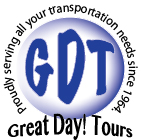
Call us
(440) 526-5350
(800) 362-4905
Fax us
(440) 526-1726
CHARTER BUSES (Mini and Full Size)
Nationwide Charter Service
TRANSPORTATION SERVICES
Contracts, Events & Conventions
MOTORCOACH TOURS
United States & Canadian Destinations
What to Know When Crossing the Border into Canada
Crossing the Border - Passport Regulations
Final passport regulations went into effect on June 1, 2009
Please Note: The WHTI-compliant documents described below are acceptable for entry or re-entry into the United States. You may be required to present additional or different travel documents when entering foreign countries, including countries in the Western Hemisphere. Before you travel, make sure you know the entry requirements of the country you plan to visit. See Country Specific Information for more information on the country you are traveling to.
Canada may not allow persons with DUI (driving under the influence of drugs or alcohol) convictions to enter their country. A Canadian immigration officer will decide if you can enter Canada when you apply for a visa, an Electronic Travel Authorization (EA), or upon your arrival at a port of entry.
 AIR TRAVEL
AIR TRAVEL
All U.S. citizens traveling by air are required to present a passport book to enter or re-enter the United States.The Enhanced Drivers License is ONLY FOR AIR TRAVEL WITHIN THE UNITED STATES and IS NOTusable for air travel to and from Canada.
LAND AND SEA TRAVEL
On June 1, 2009, the U.S. government implemented the full requirements of the land and sea phase of WHTI. The proposed rules require most U.S. citizens entering the United States at sea or land ports of entry to have a passport, passport card, or other travel document approved by the Department of Homeland Security. The Enhanced Drivers License is ONLY FOR AIR TRAVEL WITHIN THE UNITED STATES and IS NOTusable for motorcoach travel to and from Canada.
Children: U.S. citizen children under the age of 16 will be able to present the original or copy of their birth certificate, or other proof of U.S. citizenship such as a naturalization certificate or citizenship card.
Groups of U.S. citizen children ages 16 through 18, when traveling with a school or religious group, social organization, or sports team, will be able to enter under adult supervision with originals or copies of their birth certificates or other proof of citizenship. See the Department of Homeland Security's GetYouHome.gov for more information on the changing travel requirements.
Citizens or legal permanent residents of the United States do require passports or visas to cross the USA-Canada border.
Naturalized U.S. citizens should carry a naturalization certificate or some other evidence of citizenship. Legal permanent residents of the U.S. who are not U.S. citizens are advised to carry their Alien Registration Receipt Card (U.S. Form 1-151 or Form 1-551). Some persons may require a visa to enter Canada. Specific information for passengers taking cruises and foreign tours, including Europe, may have more stringent regulations and should be noted. Passengers not having acceptable identification for crossing the border (either way) may be removed by border representatives; refunds for services not received made only upon receipt of same from suppliers. We are not responsible for any costs of alternative transportation back home or other associated costs thereof. Persons under 18 years of age who are not accompanied by an adult should bring a letter from a parent or guardian giving them permission to travel to Canada. Passengers are reminded that health, accident and other insurance coverage is their personal responsibility and they are encouraged to check with their insurance provider (s) to assure that they have adequate coverage for all Canadian and foreign tours, including cruises, in addition to coverage ordinarily carried by the passenger for U.S. purposes. Trip Insurance is available and recommended. It is important to note that all details are tentative, including the date of implementation of the passport requirement. Additional information is available at www.travel.state.gov.
Crossing the U.S.-Canadian Border with Minor Children
Especially when they are not yours
As indicated all passengers crossing the U.S.-Canadian border need a passport or passport card showing their citizenship and place of permanent residence. When traveling with your own children, a simple declaration of parenthood along with passports for the children will suffice, but when you are traveling with children other than your own, due to government attempts to reduce the number of children improperly being taken out of the country, we have been advised that you will require a letter from the child’s legal guardians that must at the very least contain:
- • The child’s full name
- • The child’s birth date and that he or she is a U.S. Citizen
- • The name, address and contact telephone numbers for the legal guardians
- • The guardian’s express permission allowing you to take their child across the border
- • Dates of crossing, both into Canada and back into the USA
- • Destination (s) where you will be taking the child
- • Your name and permanent address
- • Signed and dated by the guardians
Have at least two original documents notarized. The temporary guardian or escort needs to carry a copy and keep this with his or her identification. If the child is old enough to be responsible for his or her papers, he or she should also carry a copy. If the officials at the border want or need a copy for their records, they will keep a photocopy.
(The information provided has been assembled from several sources. Great Day! Tours accepts no responsibility for its validity and the final interpretation is made by customs officials.)





